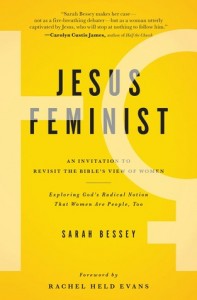 Sarah Bessey drew me into her book Jesus Feminist with a first page promise of conversation over good red wine around a fire-pit on the beach. I’m in.
Sarah Bessey drew me into her book Jesus Feminist with a first page promise of conversation over good red wine around a fire-pit on the beach. I’m in.
I really decided to take it seriously after she said on page 14 that “Patriarchy is not God’s dream for humanity.” Yes. Let’s talk about that.
And she does. With a breezy, conversational, honest style that invites a lot of people to the fire-pit to talk, Bessey offers a narrative and a take on evangelical Christian gender ideology that needs to be heard.
It won’t be evangelical enough for much of her audience. It won’t be feminist enough for much of my audience. Don’t worry, Sarah … if you’re on the margins of enough audiences, you must be writing something that needs to be said. I’m quite sure you aren’t the only one. I’m already thinking of a number of young women and men to whom I will recommend this book.
What Bessey does include enough of for this feminist theologian is her own critique of a certain type of nationalistic sexist evangelical Christianity that has emerged in recent decades and is currently supporting too much discrimination and exclusion:
“I struggled with the cultural rhetoric against immigrants, homosexuals, artists, welfare recipients, the poor, non-Americans, and anyone who looked different or lived differently than the expectation. Cultural mores were passing as biblical mandates.”
Whether it be the support for a rush to war, or tacit acceptance of a “give me more-more-more prosperity gospel” as “the rich got richer,” or the dictates about womanhood, submission, and marriage, several things conspired to cause Bessey to step back and recenter. She said she had to remember something she knew growing up, but something that got lost in the shuffle … that “Jesus thinks women are people too.”
There’s also enough scholarly support for her brief treatment of the biblical texts supporting the messages about biblical womanhood that using the word “feminist” already suggests she disavows. Bessey’s explanations of the historical context of Ephesians, Colossians, the letters to the Corinthians, 1 Timothy and 1 Peter are accessible, and ultimately essential for understanding how a person who believes that “God breathed scripture” can reconcile these texts with the realities of women’s and men’s lives in the 21st century. She even includes a nice treatment of ezer kenegdo and the “helpmate” concept from the creation narratives that’s understandable to non Hebrew-reading folks.
 I think Bessey would agree that using the Bible to proof-text an argument misses the point of its sacred narrative. And, that viewing patriarchy as an acceptable mode for human life misses the point of creation. Happily, there’s so much more to the stories that makes them all a whole lot more interesting.
I think Bessey would agree that using the Bible to proof-text an argument misses the point of its sacred narrative. And, that viewing patriarchy as an acceptable mode for human life misses the point of creation. Happily, there’s so much more to the stories that makes them all a whole lot more interesting.
Bessey describes herself as “a happy-clappy starry-eyed Jesus-loving Canadian mama.” On some people, that description would irritate me. Yet, there’s a lot about Jesus Feminist and its author that’s engaging and inviting, and perhaps will be challenging enough for some readers.
No one would describe me as happy-clappy, and I don’t think I’d refer to myself as a Jesus Feminist. Yet, I would be happy to join this conversation around the fire-pit.
I’ll even bring the Malbec. If we can also have some s’mores.












